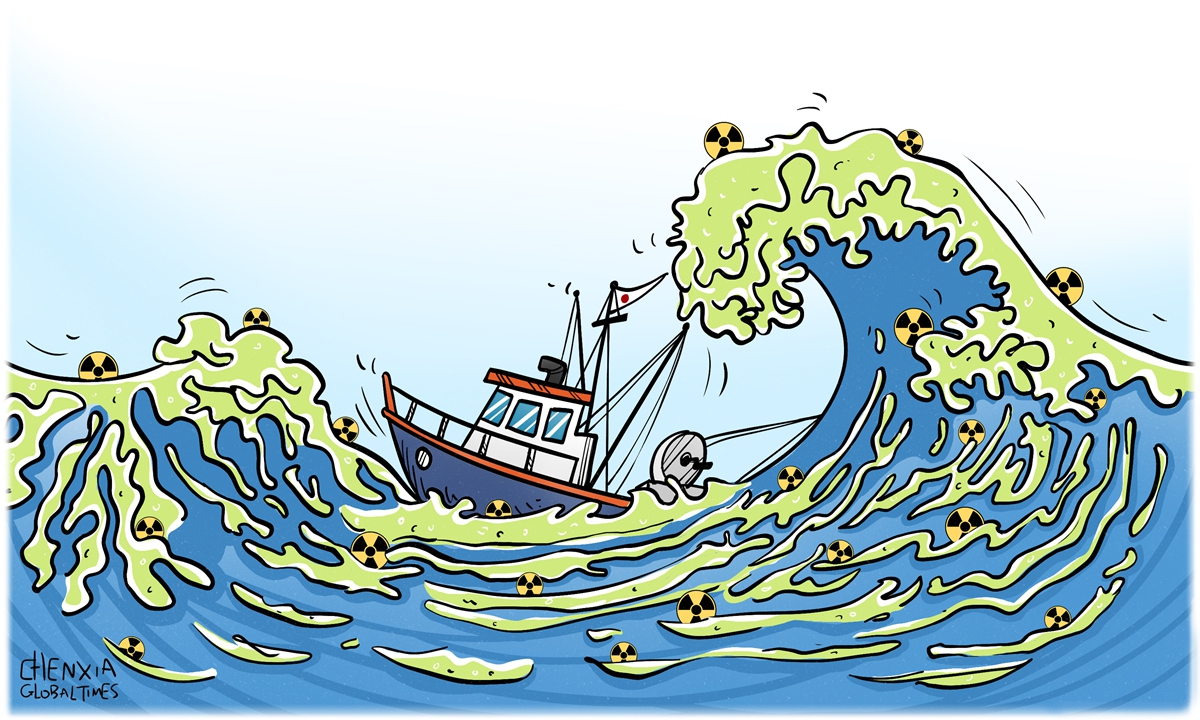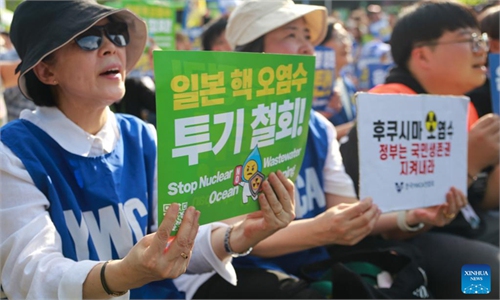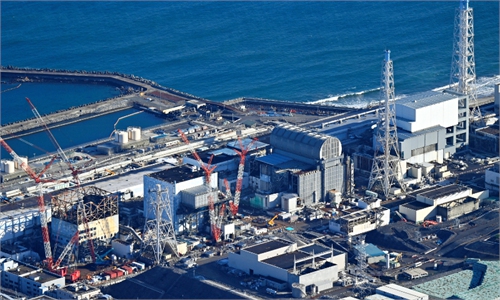
Illustration: Chen Xia/Global Times
Days after the Japanese government stubbornly began dumping nuclear-contaminated wastewater into the ocean on August 24, despite strong opposition from the domestic fishery industry and the international community, the damage to the marine environment and the fishery supply chain has become increasingly clear.In the face of strong backlash and demands from the Japanese fishery industry to stop dumping the water, the Japanese government is planning to allocate about 20 billion yen ($136.57 million) to support fishery businesses as early as this week, Japanese media outlet Kyodo news agency reported on Saturday.
Yet, while reporting the Japanese government's compensation plan for its irresponsible and wrong decision, Kyodo attributed the Japanese fishery industry's difficult situation to China's suspension of imports of Japanese aquatic products, which is misleading and ill-intentioned. Such clumsy wordplay aiming to shift blame on China fools no one.
China's decision to suspend importing aquatic products from Japan is completely legitimate, reasonable and necessary, because the Japanese government's decision to discharge the nuclear-contaminated wastewater into the sea did not take into account the strong opposition of China and the wider international community.
Looking back at the entire decision-making process of the Japanese government, it can be clearly seen that the Japanese government took an extremely selfish and irresponsible unilateral approach, which resulted in passing on the cost of handling the Fukushima nuclear accident to the whole world, causing inevitable damage to the marine environment and fishery industry chains.
Since the Japanese government has insisted on taking such wrong actions, it must face legitimate concerns and reasonable reactions from both the international and domestic communities. More importantly, Japan should take these concerns seriously and correct its wrong practices in a timely manner to avoid more chain reactions, instead of trying all means to whitewash the wrong move. Any attempt to downplay the hazards in order to confuse the public is ineffective and unwise.
The Tokyo Electric Power Co (TEPCO) acknowledged on September 1 that since the Fukushima nuclear-contaminated wastewater was discharged into the sea, Japan had detected the radioactive substance tritium for the first time in seawater sampled near the discharge port on August 31. Regarding the sharp rise in the concentration of tritium in just a few days, TEPCO admitted that this was the impact of the discharge of nuclear-contaminated wastewater into the sea, but the company insisted that this concentration was "no problem at all in terms of safety."
Japan's testing and monitoring of the impact from the dumping of nuclear-contaminated wastewater into the sea is not transparent - rather, it's vague and unilateral. The testing results provided by Japan cannot convince the outside world, let alone allow other countries to use the figures as a judgment standard to make decisions on issues like the aquatic product trade.
In terms of nuclear pollution discharge testing and information release, Japan should invite other stakeholders and international organizations to participate in the monitoring of Japan's discharge. The Japanese side should provide assistance for personnel or ships of China and other neighboring countries to monitor.
The damage will continue intensifying if Japan persists in continuing down the wrong path. If it fails to cooperate with stakeholders and treat this issue scientifically, reasonably and correctly, Japan's fishery industry will only suffer increasing losses, and Japan's compensation plan will be "a drop in the bucket."
Japan's agricultural, forestry and fishery products exports in 2022 reportedly reached the size of 1.4148 trillion yen. The 20-billion-yen subsidies from the Japanese government are of little use in making up for the losses of domestic companies. The discharge of the nuclear-contaminated wastewater will have a fundamental and long-term impact on Japan's fishery industry and overall economy. Stopping the dumping is the fundamental way to solve the problem.
Around 100 fishermen and locals living near Fukushima will file a lawsuit this week seeking to stop the contaminated water dumping, they said on Monday. The wrong policy of dumping can never be tolerated as it brings about further suffering to victims of the nuclear accident, the group said in a statement, The Straits Times reported.
It is time for the Japanese government to heed the calls and complaints from the domestic fishery industry, as well as the broader opposition and more voices from international stakeholders. The dumping of the nuclear-contaminated wastewater should be stopped immediately to avoid consequences that are more difficult to control and predict.
The author is a reporter with the Global Times. bizopinion@globaltimes.com.cn



